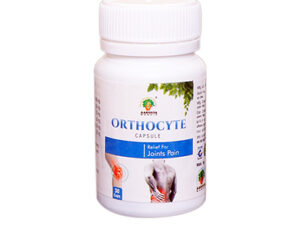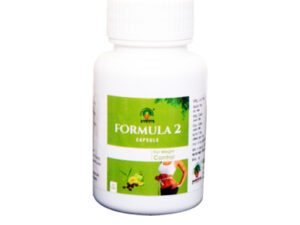PCOD FORT
Original price was: ₹1,000.00.₹750.00Current price is: ₹750.00.
PCOD stands for Poly Cystic Ovary Disease. The condition affects the ovaries in women by causing cysts. This leads to a hormonal imbalance with the body producing more male hormones than needed. The hormonal imbalance leads to problems in menstruation and fertility apart from other issues.PCOD (Polycystic Ovarian Disease) is a medical condition in which the woman ovaries produce immature or partially mature eggs in large numbers and over the time these become cysts in ovaries.
PCOD stands for Poly Cystic Ovary Disease. The condition affects the ovaries in women by causing cysts. This leads to a hormonal imbalance with the body producing more male hormones than needed. The hormonal imbalance leads to problems in menstruation and fertility apart from other issues. Women with PCOS may have irregular or prolonged menstrual cycles, as well as high levels of the male hormone androgen. The ovaries may produce a large number of tiny collections of fluid (follicles) and fail to release eggs on a regular basis. If left untreated, PCOD can cause more serious problems like heart disease and diabetes. Read on to find all you need to know about PCOD Problems.
PCOD Causes
In PCOD, many small sacs fill up with fluid inside the ovaries. Each of these contains an immature egg that never triggers ovulation. The absence of ovulation leads to a hormonal imbalance with a high release of male hormones. Research hasn’t pointed out the exact reasons why PCOD problems happen. However, certain factors contribute to it. They are:
- Genetic makeup
- Insulin Resistance
- Obesity
- High levels of inflammation
- Excess insulin
- Excess androgen
PCOD Symptoms
PCOS signs and symptoms usually appear around the time of puberty’s first menstrual period. PCOS can develop later in life, for example, as a result of significant weight gain. Many women do not realize that they are suffering from PCOD. There are certain common symptoms of PCOD problems:
- Irregular Menstruation: One of the most common signs of PCOD is irregular menstruation. Due to a high amount of male hormones, the body prevents ovulation. Many patients of PCOD have fewer than nine periods a year.
- Heavy Bleeding: Since the periods are irregular, the buildup of the uterine wall is more. This leads to heavier bleeding whenever the periods happen.
- Acne: due to higher amounts of male hormones, the skin secretes more oil causing more acne.
- Hair Growth: Most women, who suffer from PCOD, have hair growth on their face, back, stomach and chest. The condition is known as hirsutism.
- Weight: Most women who suffer from PCOD are obese or overweight.
- Crown Baldness: Most women with PCOD suffer from male pattern baldness with the hair thinning on the crown. Some even suffer complete hair loss.
- Headaches: Headaches are triggered by hormonal imbalance.
- Skin Darkening: Those who suffer from PCOD observe a darkening of the skin in the groin and the neck region.
- Increased androgens: Excessive male sex hormones can present physically as excess face and body hair, as well as male-pattern baldness.
Complications due to PCOD
- Infertility
PCOD causes infertility as it reduces the frequency of ovulation in the body.
- Diabetes
PCOD causes insulin resistance in the body leading to diabetes.
- Heart Disease
PCOD increases the blood pressure in the body leading to vulnerability towards heart problems.
- Endometrial Cancer
Because there is delayed ovulation, the body experiences a thickening of the endometrium, the inner lining of the uterus. This increases the odds of getting endometrial cancer.
Depression.
Description
PCOD stands for Poly Cystic Ovary Disease. The condition affects the ovaries in women by causing cysts. This leads to a hormonal imbalance with the body producing more male hormones than needed. The hormonal imbalance leads to problems in menstruation and fertility apart from other issues. Women with PCOS may have irregular or prolonged menstrual cycles, as well as high levels of the male hormone androgen. The ovaries may produce a large number of tiny collections of fluid (follicles) and fail to release eggs on a regular basis. If left untreated, PCOD can cause more serious problems like heart disease and diabetes. Read on to find all you need to know about PCOD Problems.
PCOD Causes
In PCOD, many small sacs fill up with fluid inside the ovaries. Each of these contains an immature egg that never triggers ovulation. The absence of ovulation leads to a hormonal imbalance with a high release of male hormones. Research hasn’t pointed out the exact reasons why PCOD problems happen. However, certain factors contribute to it. They are:
- Genetic makeup
- Insulin Resistance
- Obesity
- High levels of inflammation
- Excess insulin
- Excess androgen
PCOD Symptoms
PCOS signs and symptoms usually appear around the time of puberty’s first menstrual period. PCOS can develop later in life, for example, as a result of significant weight gain. Many women do not realize that they are suffering from PCOD. There are certain common symptoms of PCOD problems:
- Irregular Menstruation: One of the most common signs of PCOD is irregular menstruation. Due to a high amount of male hormones, the body prevents ovulation. Many patients of PCOD have fewer than nine periods a year.
- Heavy Bleeding: Since the periods are irregular, the buildup of the uterine wall is more. This leads to heavier bleeding whenever the periods happen.
- Acne: due to higher amounts of male hormones, the skin secretes more oil causing more acne.
- Hair Growth: Most women, who suffer from PCOD, have hair growth on their face, back, stomach and chest. The condition is known as hirsutism.
- Weight: Most women who suffer from PCOD are obese or overweight.
- Crown Baldness: Most women with PCOD suffer from male pattern baldness with the hair thinning on the crown. Some even suffer complete hair loss.
- Headaches: Headaches are triggered by hormonal imbalance.
- Skin Darkening: Those who suffer from PCOD observe a darkening of the skin in the groin and the neck region.
- Increased androgens: Excessive male sex hormones can present physically as excess face and body hair, as well as male-pattern baldness.
Complications due to PCOD
- Infertility
PCOD causes infertility as it reduces the frequency of ovulation in the body.
- Diabetes
PCOD causes insulin resistance in the body leading to diabetes.
- Heart Disease
PCOD increases the blood pressure in the body leading to vulnerability towards heart problems.
- Endometrial Cancer
Because there is delayed ovulation, the body experiences a thickening of the endometrium, the inner lining of the uterus. This increases the odds of getting endometrial cancer.
Depression.








Reviews
There are no reviews yet.